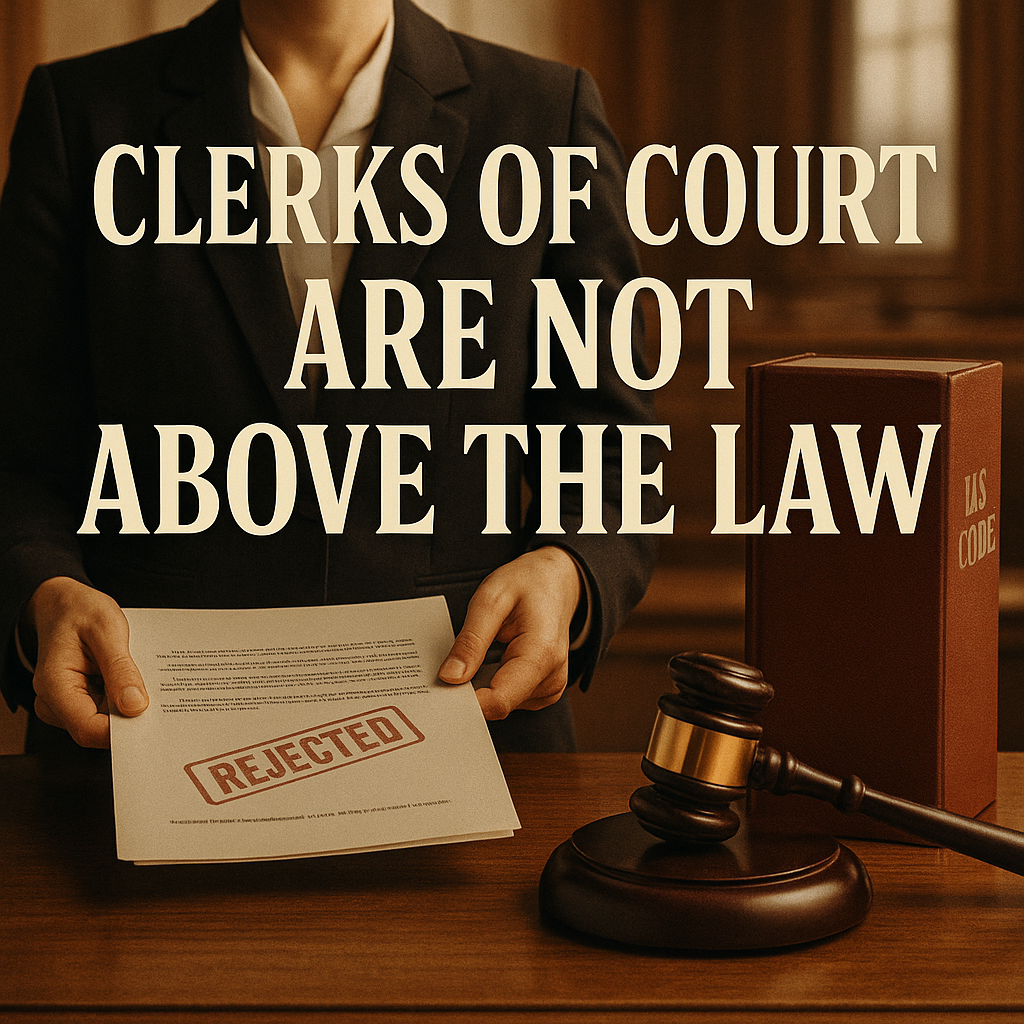“Clerks of Court Are Not Above the Law: The Ethics and Charges for Refusing Proper Filings”

Across America, people walk into courthouses every day to file paperwork — motions, notices, affidavits, trusts, liens, or payment vouchers — only to be told “we can’t accept that.”
But here’s the truth: the clerk of court is not a judge. Their duty is ministerial — meaning they must file what is properly presented, not decide the case, not interpret the law, and not discriminate based on who submits it.
When a clerk refuses properly formatted filings or lawful payment, that is not a clerical choice — it’s an ethical and constitutional violation.
⚖️ Legal Duty of Clerks
Under Title 28 U.S. Code § 951–957 and state equivalents, court clerks are sworn public officers. Their duties include:
Accepting and filing all pleadings, notices, and documents presented in proper form.
Maintaining the record of the court without bias.
Issuing receipts and recording payments.
They cannot act as gatekeepers or judges, and they have no lawful discretion to reject filings that meet procedural form.
🚫 When Refusal Becomes Misconduct
If a clerk refuses to file a document that is in proper form, or rejects lawful payment (especially when made in U.S. currency, money order, or negotiable instrument), the following laws may apply:
18 U.S.C. § 241–242 – Deprivation of Rights Under Color of Law
It is a federal offense for any public official to deprive someone of rights secured by the Constitution or federal law.
Penalty: fines and imprisonment (up to 10 years; life if serious injury results).
42 U.S.C. § 1983 – Civil Rights Action for Deprivation of Rights
Any person acting under state authority who denies someone’s lawful access to the court can be sued personally and officially.
State Ethics Codes – Most states have court clerk ethics rules under judicial conduct boards.
Violations include: refusal to file, altering records, discrimination, abuse of authority, and misrepresentation of court policy.
Penalty: termination, fines, disbarment from public service, or criminal referral.
Obstruction of Justice (18 U.S.C. § 1505 / § 1512)
If a clerk’s refusal or alteration of filing intentionally interferes with a legal process, it can rise to obstruction of justice.
🕊️ Equal Access Is a Constitutional Right
Under the First and Fourteenth Amendments, every person has the right to petition the government for redress and to access the courts without discrimination.
When a clerk refuses a filing based on appearance, private status, lack of a lawyer, or paperwork content — they are interfering with a fundamental right.
Courts themselves have affirmed this:
“Clerks have no discretion to refuse filings; their function is purely ministerial.” — United States v. Lombardo, 241 U.S. 73 (1916)
“A clerk cannot pass on the sufficiency of pleadings.” — Reno v. Osburn, 212 P. 775 (Okla. 1923)
💡 How to Respond
If a clerk refuses your paperwork or payment:
Document everything. Record the name, date, and reason given.
Request a written refusal or “Refusal for Cause” statement.
Send a Notice of Misconduct / Notice of Liability addressed to the Clerk and their Supervisor.
File a grievance with the Judicial Conduct Board or state ethics commission.
Keep proof of your filing attempt — the date, witness statement, or even mailing receipt — so your record shows “tender made.”
🧩 Closing Thoughts
Clerks of court swear an oath to uphold the Constitution, not to protect selective interests. Refusing lawful filings is not just rude — it’s a breach of trust and an abuse of public office.
Every citizen has the right to have their documents recorded and acknowledged in the public record.
Transparency is the foundation of justice — and clerks are the first gate.
🕊️ “When the gatekeeper locks the gate, justice never enters.”



